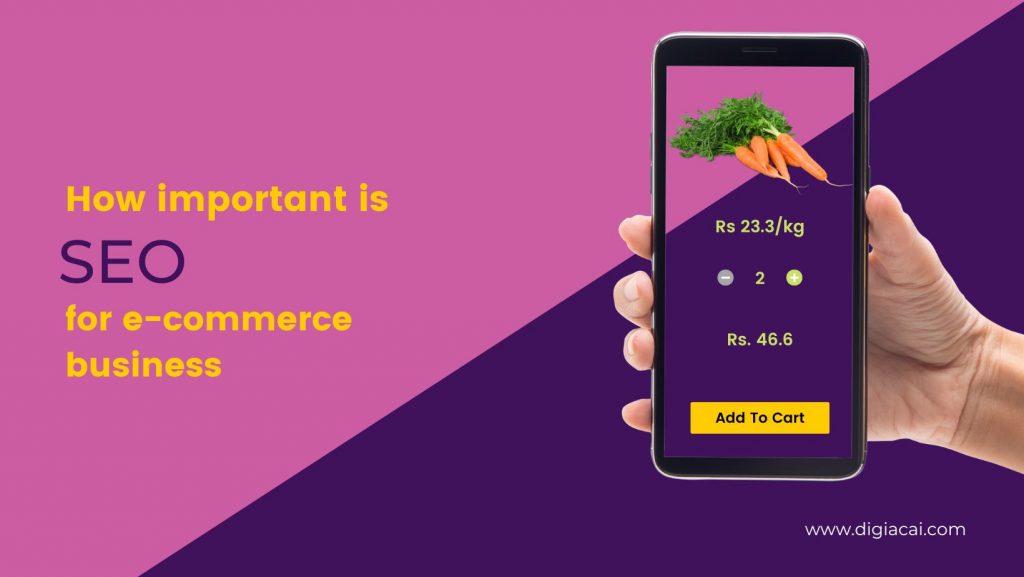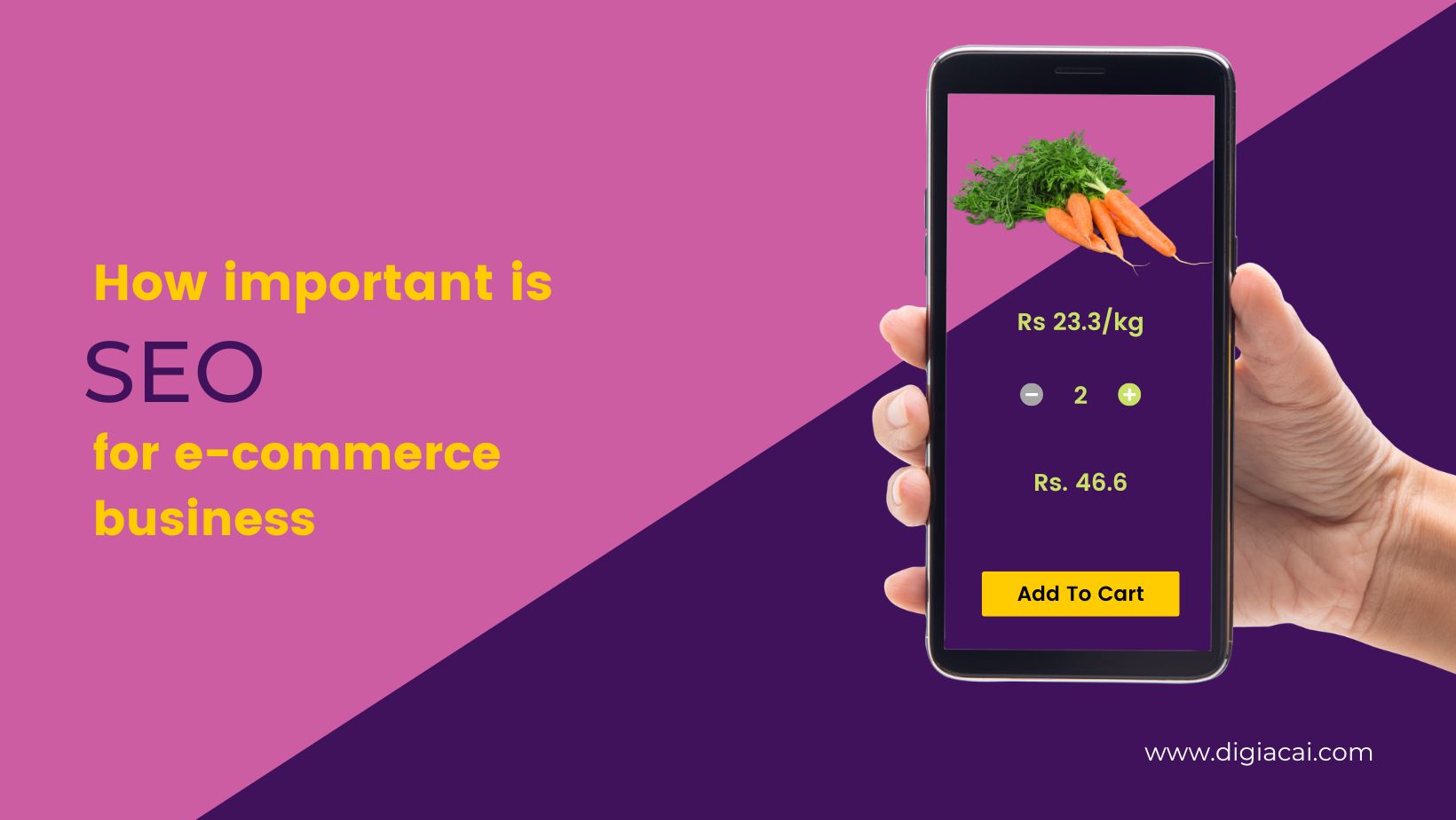
Introduction
Search Engine Optimisation (SEO) is an essential technique for improving the visibility and ranking of a website or web page in search engine results. E-commerce businesses rely heavily on their websites or online stores for traffic and sales, making it crucial to optimise their online presence to attract more customers.
This article will explore the significance of SEO for e-commerce websites, its advantages, obstacles, and actionable tactics to improve it.
Maximising E-commerce Success: Choosing the right Tech Platforms
There are several online platforms that act as an enabler if you plan to build a D2C or e-commerce brand.
There is no right or wrong tech platform for your business. You should, however, keep the following parameters in mind when choosing a tech platform for your online business:
- How much is your budget?
- What features are you looking for?
- Are you able to afford a team, or would you instead do it yourself
- In the next few months to one year, how many products would you like to have
Did you know that over 13000 e-commerce brands in India have their online stores set up on Shopify? The number also includes fastest growing D2C brands like Boat Lifestyle, Sugar, Lotus Cosmetics and more.
Tech Platforms for e-Commerce
Shopify, Magento, and WooCommerce are popular platforms for e-commerce businesses that sell their products or services online. Big marketplaces usually create their own custom platforms to add much advanced functionalities and features.
These platforms, commonly known as E-commerce enablers, offer customers a convenient and user-friendly interface to search, browse and purchase products. They allow customers to add products to their shopping cart and complete transactions securely through various payment gateways like credit/debit cards, digital wallets, or bank transfers. The process is seamless and easy to navigate, ensuring a hassle-free shopping experience for the customers.
Well-known examples of D2C brands on Shopify in India include Lotus Herbals, MCaffeine, XYXX, iTokri etc. Some of the top e-commerce players with their own custom platforms are Amazon, Flipkart, Nykaa, Urbanladder and more.
For small-to-medium-sized e-commerce companies, Shopify is a popular platform that provides all the necessary tools to create an online store, manage inventory, process payments, and track shipments.
Similarly, Magento is another widely-used e-commerce platform that offers advanced SEO features to improve website ranking and visibility. Through Magento SEO, companies can optimise their online store to increase traffic, sales, and revenue and gain a competitive edge in the e-commerce industry. Some popular Indian brands on the Magento platform are Shop Disney, Dottedi, Haldirams Online and more.
A good tech platform is also crucial to the success of your SEO strategy.The Digi Acai team recommends small businesses choose a DIY, SEO-friendly platform that’s easy to use and cost-effective.
Benefits Of SEO For E-Commerce Websites
When it comes to e-commerce, implementing effective SEO strategies can provide businesses with a competitive edge and numerous advantages. Some of the benefits of e-commerce SEO include the following:
1. Increased Organic TrafficOne of the significant advantages of SEO for e-commerce websites is the increase in organic traffic. Organic traffic refers to visitors who reach the website through a search engine (say Google) results. SEO strategies such as keyword research and optimisation can help improve the website’s ranking in search engine results, leading to more organic traffic. | 2. Driving More Sales:SEO can also help drive more sales for e-commerce websites. Improving the website’s visibility and ranking in search engine results will attract more potential customers, ultimately increasing sales. | 3. Improved User ExperienceSEO can help improve the website’s user experience. SEO strategies such as optimising the website’s loading speed and improving the website’s navigation can help improve the user experience, which can lead to increased engagement and conversions. | 4. Establishing Brand CredibilitySEO can help establish brand credibility for e-commerce websites. A higher ranking in search engine results can help establish the website as a credible source for products and services, which can help attract more customers. |
Want to know how you can get all these benefits? We have discussed below the best SEO strategies for E-commerce Websites. Keep reading!
Effective SEO Strategies for E-commerce Websites
A strong SEO strategy for e-commerce websites is essential for attracting potential customers and increasing sales. The following are some of the most effective SEO strategies for e-commerce websites:
- Keyword Research:
Keyword research is crucial in e-commerce SEO strategy. It involves identifying the keywords and phrases potential customers search for and optimising the website’s content accordingly. Keyword research helps e-commerce websites understand what their customers are looking for and how to optimise their websites to attract more potential customers.
- On-Page Optimisation:
On-page optimisation involves optimising the website’s content, including meta tags, header tags, and image alt tags. On-page optimisation can help improve the website’s ranking in search engine results. E-commerce websites must ensure that the content they publish is optimised for search engines and provides value to the customers.
- Off-Page Optimisation:
Optimising the website’s online presence through link building, social media marketing, and guest blogging. Off-page optimisation can improve the website’s visibility and attract more potential customers. E-commerce websites must have a robust online presence to attract more customers.
- Link Building:
Link building involves obtaining backlinks from credible websites to improve a website’s search engine ranking and attract potential customers. By partnering with other reputable websites, e-commerce websites can acquire high-quality backlinks and boost their online presence, increasing traffic, higher conversion rates, and increased revenue. An effective e-commerce link building strategy is crucial for businesses to stay competitive in the digital landscape.
- Content Creation:
Content creation involves creating unique and engaging content for the website, including blog posts, product descriptions, and videos. Content creation can help improve the website’s ranking in search engine results and attract more potential customers. E-commerce websites must create high-quality content that provides value to the customers.
- Technical SEO:
E-commerce websites should implement effective SEO strategies to increase online visibility, attract potential customers, and boost sales. However, they must also take into account specific SEO challenges. Let’s take a closer look at these issues.
Common SEO Challenges Faced By E-Commerce Websites
Search Engine Optimization (SEO) is a critical element in the success of an e-commerce website. A well-optimised website can attract more organic traffic, increase conversion rates, and generate more revenue. However, e-commerce websites face several SEO challenges that can impact their online visibility, ranking, and profitability. Here are some of the common SEO challenges faced by e-commerce websites.
- Heavy Competition:
One of the biggest SEO challenges faced by e-commerce websites is heavy competition. The e-commerce market is highly competitive, and it can be challenging for new and small businesses to rank high on search engine results pages (SERPs) for relevant keywords. Established players in the industry have already built a strong online presence, and their websites have high domain authority, which makes it difficult for new businesses to compete.
E-commerce websites can overcome this challenge by emphasising the development of a robust SEO strategy, which involves conducting comprehensive keyword research, implementing on-page optimization techniques, and building high-quality links. They can also concentrate on using long-tail keywords and optimising for local search to target particular niches and geographical regions.
- Lack of Right Links Acquisition:
Link building is essential to SEO, but many e-commerce websites need help to acquire the right links. The wrong links can hurt their website’s ranking and online reputation and even lead to penalties from search engines. E-commerce websites must focus on acquiring high-quality links from authoritative websites in their industry or niche.
E-commerce websites can get the right links by concentrating on generating high quality content that other websites would find valuable enough to link to, establishing connections with influencers and bloggers in their niche, and utilising social media platforms to promote their website and content.
- Not Linking SEO Strategy with Overall Business Strategy:
Another common SEO challenge faced by e-commerce websites is not linking their SEO strategy with their overall business strategy. Many e-commerce businesses focus solely on SEO tactics without considering their overall business goals, brand, and customer experience.
To address this problem, e-commerce websites need to develop an SEO strategy that aligns with their overall business strategy. They should focus on creating a website that provides an excellent user experience, offers high-quality products, and meets customers’ needs. They should also consider their branding, customer engagement, and retention strategies when developing their SEO plan.
- Poor Site Structure and Navigation:
E-commerce websites with poor site structure and navigation can struggle to rank high on search engine results pages. If search engines have a hard time crawling and indexing a website’s pages, they may not show up in search results, which can impact their organic traffic and revenue.
To overcome this challenge, e-commerce websites need to ensure that their site structure is logical and easy to navigate. They should use internal linking to help search engines find and index their pages, and they should optimise their URLs, titles, and meta descriptions for search engines.
- Duplicate Content:
E-commerce websites often face the challenge of duplicate content. Product descriptions, reviews, and other content can be duplicated across the website, which can hurt their SEO efforts. Search engines penalise websites for duplicate content because it can impact the user experience and make it difficult for search engines to determine the most relevant content.
To work around this challenge, e-commerce sites must ensure that their content is unique and of high quality. They should also use canonical tags to help search engines determine the original source
Tips For Improving SEO For E-Commerce Websites
Now that we have discussed the challenges faced by e-commerce websites, let’s focus on some tips to improve SEO for these websites:
- Conduct regular SEO audits:
Regular SEO audits help you identify technical issues, broken links, and other areas of improvement. Reviewing your website’s SEO regularly, at least once a year, is crucial to ensure that your website is optimised for search engines. SEO audits can help identify issues such as slow website speed, duplicate content, missing meta descriptions, and title tags. You can improve your website’s search engine visibility and rankings by fixing these issues.
- Keep up with search engine algorithms:
Search engine algorithms are continually changing, and staying updated with the latest algorithm updates is crucial. By keeping up with these updates, you can optimise your website and ensure it complies with search engine guidelines, improve your website’s rankings, and increase organic traffic.
- Create relevant content:
Creating relevant content is essential to improving your e-commerce website’s SEO. Relevant content helps build authority and gets more eyeballs to your website. The more relevant, informative and engaging the content you create for your site, the more visitors you’ll attract, which leads to higher conversions. Adding new or updated content can help improve rankings by providing search engines with fresh material to crawl.
- Link Acquisition:
Link acquisition is another important factor in improving your e-commerce website’s SEO. High-quality links from other websites can help improve your search engine rankings. You can use several tactics to acquire links, including writing guest posts and contacting influential bloggers or website owners. The more reputable sites that link back to your pages, the higher those pages will rank in search results on major search engines like Google.
- Optimise product pages:
Optimising your e-commerce website’s product pages is essential for improving its search engine visibility. To optimise your product pages, you should include relevant keywords in the products’ titles, descriptions and meta tags. Additionally, ensure that your product pages contain unique content (not copied from another website) and high-quality images and are easy for customers to navigate through categories.
- Use high-quality images and videos:
High-quality images and videos enhance user experience and engagement on your e-commerce website. High-quality media can showcase your products and give visitors a better understanding of your brand. In addition, high-quality content can improve your website’s search engine ranking by giving search engines relevant information to index.
- Focus on user experience:
User experience is critical for e-commerce websites. A good user experience can increase engagement, higher conversions, and improve search engine ranking. To improve your website’s user experience, focus on easy navigation, fast load times and mobile optimisation. Additionally, don’t ignore the checkout process – it’s an often overlooked aspect of UX!
- Monitor website speed and performance:
Website speed and performance are crucial factors for improving your e-commerce website’s search engine ranking. Slow-loading pages and poor website performance can lead to a higher bounce rate and reduced engagement. It is important to monitor your website’s speed and performance, and you can do this by using tools such as Google PageSpeed Insights or GTmetrix. Additionally, you should ensure that your website is hosted on a reliable server with optimised images and code.
Conclusion
To summarise, SEO plays a crucial role in the success of e-commerce websites by attracting more traffic and driving sales. Optimising product pages, mobile devices, site speed, and content can improve search engine rankings and attract more customers. In addition, regular SEO audits and social media marketing can further enhance the online presence of an e-commerce website.
To achieve these objectives, e-commerce businesses can collaborate with SEO agencies that offer a variety of services, including website audits, on-page optimization, off-page optimization, and SEO reporting.
Digi Acai is one such specialised SEO agency in India that focuses on helping direct-to-consumer (D2C) brands achieve high organic growth. Their approach is to provide customised SEO strategies and action plans based on each client’s unique requirements, taking into account market conditions, competition, and business objectives. Digi Acai uses the latest SEO tools and practices to deliver personalised services and ensure continued success in the online marketplace.
If you’re an e-commerce business looking to enhance your online presence and increase sales, reach out to team Digi Acai today to learn how they can help your business achieve its goals.
FAQS
Q: Is SEO important for eCommerce?
A: Yes, SEO is crucial for eCommerce as it can help improve the visibility and ranking of a website in search engines which can lead to more organic traffic, higher conversion rates, and increased revenue for the eCommerce business.
Q: How do I find keywords for eCommerce?
A: There are several ways to find keywords for eCommerce, including using keyword research tools like Google Keyword Planner, analysing competitor websites, and researching popular search terms related to your products or industry.
Q: Can you do SEO on Shopify?
A: Yes, Shopify offers several built-in features and tools that allow users to optimise their eCommerce website for SEO. These include customisable meta titles and descriptions, SEO-friendly URLs, mobile-responsive themes, image optimisation, blogging capabilities, and integration with Google Analytics.
Q: Why is Shopify SEO important?
A: Shopify SE/O is important because it can help improve the visibility and ranking of an eCommerce store in search engines, leading to more organic traffic and higher conversion rates, ultimately resulting in increased revenue for the eCommerce business.
Q: How much does Shopify SEO cost?
A: The cost of Shopify SEO can vary depending on the level of optimisation required and the project’s scope. Some eCommerce businesses handle SEO in-house, while others hire a professional e-commerce SEO agency or consultant. The cost can vary depending on the level of service required.






